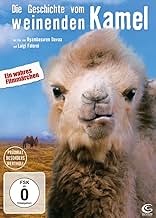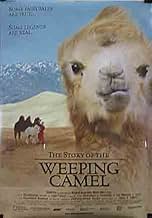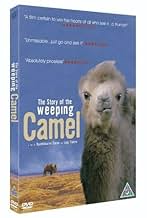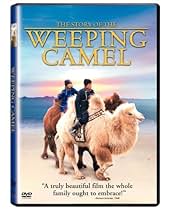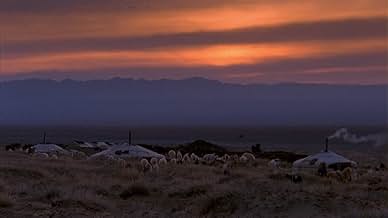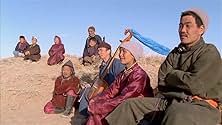IMDb RATING
7.4/10
6.5K
YOUR RATING
When a Mongolian nomadic family's newest camel colt is rejected by its mother, a musician is needed for a ritual to change her mind.When a Mongolian nomadic family's newest camel colt is rejected by its mother, a musician is needed for a ritual to change her mind.When a Mongolian nomadic family's newest camel colt is rejected by its mother, a musician is needed for a ritual to change her mind.
- Directors
- Writers
- Stars
- Nominated for 1 Oscar
- 10 wins & 9 nominations total
- Directors
- Writers
- All cast & crew
- Production, box office & more at IMDbPro
Featured reviews
If you are fed up with Hollywood glitz and special effects. If you are tired of hearing overpaid actors whining about how hard life is when having to film away from home, then you would be a fool not to watch this splendid film.
It would be too easy to say it is a documentary or a drama documentary. It is neither. It is, in the old term, 'cinema verite' at its best with good editing. Or even 'fly on the wall'. It is a truly wonderful story that has what many films should have: a beginning, a middle and an end.
I see no point in over analysing components of the film. To do so would destroy the theme. It is a story told in in the style of Aesop but it is far from a fable. The camera work (from a novice!) is stunning. There are no wild hand-held camera angles, just luscious close ups and exquisite panoramic views. Thankfully there are no blurred short depth of field shots - as is common in too many modern films.
It will leave you with a warm glow and hopefully raise many questions about the values that we as a human race share and are losing. If you have seen the Korean "The Way Home" you will love this contribution to the world of film. It is a truly excellent and heart warming experience.
It would be too easy to say it is a documentary or a drama documentary. It is neither. It is, in the old term, 'cinema verite' at its best with good editing. Or even 'fly on the wall'. It is a truly wonderful story that has what many films should have: a beginning, a middle and an end.
I see no point in over analysing components of the film. To do so would destroy the theme. It is a story told in in the style of Aesop but it is far from a fable. The camera work (from a novice!) is stunning. There are no wild hand-held camera angles, just luscious close ups and exquisite panoramic views. Thankfully there are no blurred short depth of field shots - as is common in too many modern films.
It will leave you with a warm glow and hopefully raise many questions about the values that we as a human race share and are losing. If you have seen the Korean "The Way Home" you will love this contribution to the world of film. It is a truly excellent and heart warming experience.
In the Gobi desert, where a nomadic tribe tends its camels like Jay Leno his automobiles, a mother rejects a white calf just delivered with difficulty. The society's initiative to bring mother to nurse the child is the center of an otherwise simple plot. The astounding cinematography (Yes, the desert is stunning even after 90 minutes) and the scrubbed-face happiness of the family are the real stars of this half documentary, half reenactment of a crisis every bit as important to this family as a birth is to a tightly-knit family anywhere in the rest of the world.
And yet a theme appears as I reflect on the happiness of this attractive clan: the emergence of modernism even in Mongolia. In two young men's 50-kilometer journey to find help for the camel, they discover television and computer games. The younger boy, fascinated by the technology, asks his father to purchase a TV. The grandfather gently offers his concern that the boy would be watching fleeting glass images-the case is closed, a powerful reminder of the benign presence of grandparents in this culture, the wisdom of elders, and the fresh-aired innocence of the clan, which will not give itself up easily to modern distractions. Besides, it is abundantly clear they don't need passive entertainment.
The ceremony to reconcile the mother and calf includes primitive music by a teacher and impressive solo singing by a young woman. No one could possibly turn to TV while watching this transcendent act. `Whale Rider's' heightened sense of the magical in the mundane and the unbelievable bond of young and old is the only other recent film I can think of to approach this film's simple power.
`The Story of the Weeping Camel' is as slow as the culture it shows, so be cautious about bringing restless city children. The story lingers on the actual birth of the white calf, possibly disconcerting to the younger, inexperienced members of the audience. Then why do the film's characters get such joy out of the minor warnings I just gave? It is their life, as blessed and happy as any you will see on film or anywhere else on earth.
The camel's soulful cry in the vast desert will stay with you. As Lafcadio Hearn said, `If you ever become a father, I think the strangest and strongest sensation of your life will be hearing for the first time the thin cry of your own child.' And that goes for the mother's cry as well.
A beautiful film out of time and step with a lesser world outside.
And yet a theme appears as I reflect on the happiness of this attractive clan: the emergence of modernism even in Mongolia. In two young men's 50-kilometer journey to find help for the camel, they discover television and computer games. The younger boy, fascinated by the technology, asks his father to purchase a TV. The grandfather gently offers his concern that the boy would be watching fleeting glass images-the case is closed, a powerful reminder of the benign presence of grandparents in this culture, the wisdom of elders, and the fresh-aired innocence of the clan, which will not give itself up easily to modern distractions. Besides, it is abundantly clear they don't need passive entertainment.
The ceremony to reconcile the mother and calf includes primitive music by a teacher and impressive solo singing by a young woman. No one could possibly turn to TV while watching this transcendent act. `Whale Rider's' heightened sense of the magical in the mundane and the unbelievable bond of young and old is the only other recent film I can think of to approach this film's simple power.
`The Story of the Weeping Camel' is as slow as the culture it shows, so be cautious about bringing restless city children. The story lingers on the actual birth of the white calf, possibly disconcerting to the younger, inexperienced members of the audience. Then why do the film's characters get such joy out of the minor warnings I just gave? It is their life, as blessed and happy as any you will see on film or anywhere else on earth.
The camel's soulful cry in the vast desert will stay with you. As Lafcadio Hearn said, `If you ever become a father, I think the strangest and strongest sensation of your life will be hearing for the first time the thin cry of your own child.' And that goes for the mother's cry as well.
A beautiful film out of time and step with a lesser world outside.
The Mongols are a fascinating people who at one time, conquered more of our planet than any other nation or civilization. The supreme irony in all this was that the Mongols themselves were hardly "civilized," i.e., linked to living in cities supported by extensive agricultural complexes, but were traditionally pastoralists. However, they were one of the most efficient fighting forces in history, as they swept from the Chinese coast through the Eastern Mediterranean and up to the banks of the Danube in Europe. But, little is known about these marvelous people who are ancestors to the Manchus, Koreans and Japanese of today. Here is a wonderful little tale, albeit somewhat stylized, which gives us a glimpse of Mongol pastoral life on the brink of globalization. The subtle mixture of their traditional pastoral existence, e.g., yurts, herding, gathering fuel, etc., with that of the modern, e.g., the musician brings his morinkhuur (Mongol Viola) to camp on a motorcycle to perform an ancient ritual, is marvelously done.
The Mongol Bactria's camel nomads are rather marginal to the great majority of pastoralists, many of which still herd their sheep on their stout Mongol horses. These marvelous two-humped camels are now only found in Mongolia and this film showing their continuing way of life is simply wonderful.
The Mongol Bactria's camel nomads are rather marginal to the great majority of pastoralists, many of which still herd their sheep on their stout Mongol horses. These marvelous two-humped camels are now only found in Mongolia and this film showing their continuing way of life is simply wonderful.
If anyone had ever told me that a movie about nomadic shepherds in Mongolia and a couple of camels could hold my interest and feelings the way this movie did I would have suggested they see a shrink.
It can only be described as a wonderful story that makes the most complex of Hollywood screen-plays look silly.
Great for all generations.
It can only be described as a wonderful story that makes the most complex of Hollywood screen-plays look silly.
Great for all generations.
There's a new style of film eking into the film biz called "Narrative Documentary." What? An oxymoron you tutt-tutt silently as you read.Well, yes and no. It describes a documentary that has been embellished with narrative scenes to ultimately create the arc-drama one finds in a feature film with the intelligence of a documentary.
Narrative documentary is truly an appropriate expression for this wonderfully unique and intriguing little gem, The Story of the Weeping Camel.
As you watch the fairly simple tale of a camel that after a grueling birthing of her albino calf, she decides she's not interested in the ideas of motherhood and abandons the newborn to fend for itself.
Sounds positively dull until you start to watch this young mother and the footage the filmmakers gathered and you are pulled in - mesmerized, "How did the film crew get this?" It feels like a documentary, looks like a documentary but then there's the story obviously running along side the remarkable footage that you realize is scripted, storyboarded and a team behind the lens have planned. Amazing.
Narrative documentary is truly an appropriate expression for this wonderfully unique and intriguing little gem, The Story of the Weeping Camel.
As you watch the fairly simple tale of a camel that after a grueling birthing of her albino calf, she decides she's not interested in the ideas of motherhood and abandons the newborn to fend for itself.
Sounds positively dull until you start to watch this young mother and the footage the filmmakers gathered and you are pulled in - mesmerized, "How did the film crew get this?" It feels like a documentary, looks like a documentary but then there's the story obviously running along side the remarkable footage that you realize is scripted, storyboarded and a team behind the lens have planned. Amazing.
Did you know
- TriviaOfficial submission of Mongolia for the 'Best Foreign Language Film' category of the 76th Academy Awards in 2004.
- ConnectionsFeatured in The 77th Annual Academy Awards (2005)
- How long is The Story of the Weeping Camel?Powered by Alexa
Details
- Release date
- Countries of origin
- Official sites
- Language
- Also known as
- Ağlayan Devenin Öyküsü
- Filming locations
- Production companies
- See more company credits at IMDbPro
Box office
- Gross US & Canada
- $1,763,052
- Opening weekend US & Canada
- $21,767
- Jun 6, 2004
- Gross worldwide
- $9,328,652
- Runtime
- 1h 33m(93 min)
- Color
- Sound mix
- Aspect ratio
- 1.85 : 1
Contribute to this page
Suggest an edit or add missing content


